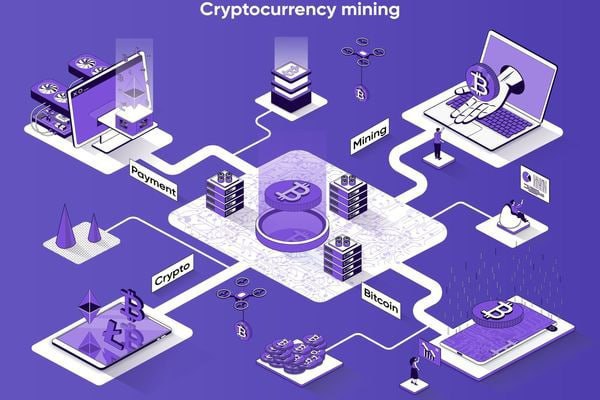
What is Cryptocurrency mining ?
Today, We’re discussing about What is Cryptocurrency mining ?. Mining is the process of Validating and adding new transactions to a blockchain.
Cryptocurrency Mining
cryptocurrency mining is the process of validating and adding new transactions to a blockchain, as well as creating new units of the cryptocurrency as a reward for the mining activity. It is a crucial component of many decentralized cryptocurrencies, such as Bitcoin, Ethereum, and others, that use a proof-of-work (PoW) consensus mechanism.
Here are the key aspects of crypto mining:
– Proof-of-Work Consensus: Most cryptocurrencies that rely on mining use a proof-of-work consensus algorithm. Miners compete to solve complex mathematical puzzles or algorithms to validate transactions and create new blocks on the blockchain. The first miner to solve the puzzle and add the block to the chain is rewarded with newly minted cryptocurrency.
– Mining Equipment: To participate in mining, miners typically use specialized hardware, such as application-specific integrated circuits (ASICs) or graphics processing units (GPUs). These devices are optimized for the specific mining algorithm used by the cryptocurrency.
– Mining Pools: Due to the increasing difficulty and competitiveness of mining, many miners join mining pools. Mining pools combine the computing power of multiple miners, allowing them to work collectively on solving puzzles and sharing the rewards based on their contributions.
– Energy Consumption: Crypto mining is computationally intensive and requires substantial energy resources. Miners need powerful hardware and run them continuously to solve the mathematical puzzles. As a result, mining operations consume a significant amount of electricity, leading to discussions around the environmental impact of mining.
– Block Rewards: Miners are rewarded with newly minted cryptocurrency as an incentive for their mining efforts. The specific reward amount varies depending on the cryptocurrency. For example, Bitcoin rewards miners with new Bitcoins, while Ethereum rewards miners with Ether.
– Network Security: Crypto mining plays a vital role in securing the blockchain network by ensuring that transactions are valid and preventing double-spending. Miners’ computational power makes it computationally expensive for malicious actors to manipulate the blockchain.
– Mining Difficulty: To maintain a consistent block creation rate, the mining difficulty adjusts periodically. The difficulty level increases as more miners join the network, ensuring that new blocks are added at a regular pace.
It’s important to note that not all cryptocurrencies rely on mining, and alternative consensus mechanisms, such as proof-of-stake (PoS), have been developed to address scalability, energy consumption, and environmental concerns associated with mining.
Crypto mining can be a profitable venture for miners who have access to cost-effective electricity, efficient mining equipment, and a favorable mining environment. However, it requires careful consideration of factors such as hardware costs, electricity expenses, network difficulty, and the potential risks and rewards associated with the specific cryptocurrency being mined.


